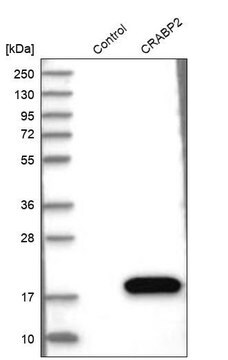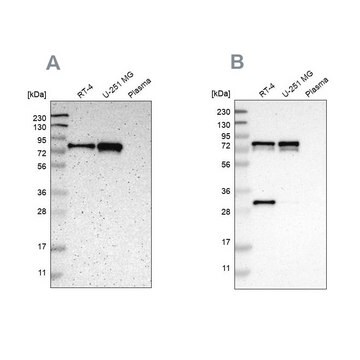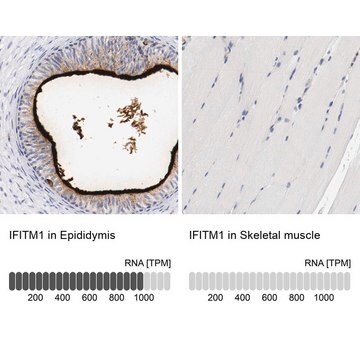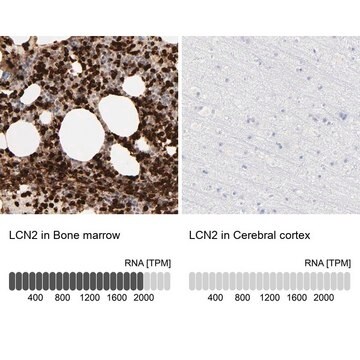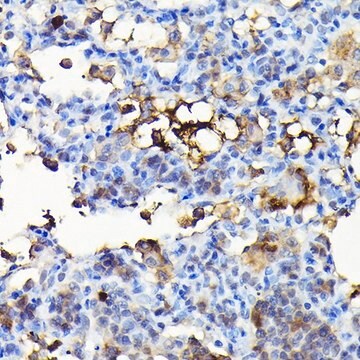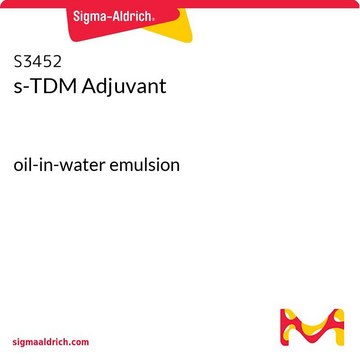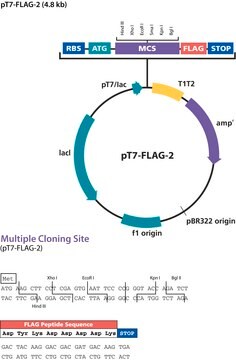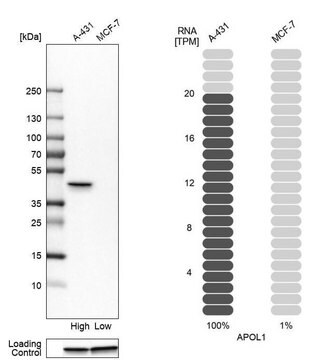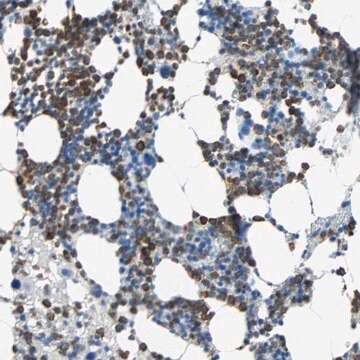推荐产品
生物源
rabbit
共軛
unconjugated
抗體表格
affinity isolated antibody
抗體產品種類
primary antibodies
無性繁殖
polyclonal
產品線
Prestige Antibodies® Powered by Atlas Antibodies
形狀
buffered aqueous glycerol solution
物種活性
human
技術
immunoblotting: 0.04-0.4 μg/mL
immunohistochemistry: 1:50-1:200
免疫原序列
SCYFFSTDTISWALSLKNCSAMGAHLVVINSQEEQEFLSYKKPKMREFFIGLSDQVVEGQWQWVDGTPLTKSLSFWDVGEPNNIATLEDCATMRDSSNPRQNWNDVTCFLNYFRI
UniProt登錄號
運輸包裝
wet ice
儲存溫度
−20°C
目標翻譯後修改
unmodified
基因資訊
human ... CLEC4E(26253)
一般說明
CLEC4E (C-type lectin domain family 4, member E) belongs to C-type lectin receptors, which is a family of pattern recognition receptors. C-type lectin receptor family has more than 1000 members and includes any protein which has one or more C-type lectin-like domain (CLTD). CLEC4E, also called mincle, is a type II transmembrane protein, which is 219 aa long and has a highly conserved CLTD. CLEC4E is located on human chromosome 12 within the natural killer (NK) gene complex, which also includes BDCA-2, DCAR, DCIR, Dectin-2, and Clecsf8. CLEC4E protein has a single transmembrane domain, a short N- terminal cytoplasmic domain and a C-terminal extracellular C-type lectin carbohydrate recognition domain.
免疫原
C-type lectin domain family 4, member E recombinant protein epitope signature tag (PrEST)
應用
All Prestige Antibodies Powered by Atlas Antibodies are developed and validated by the Human Protein Atlas (HPA) project and as a result, are supported by the most extensive characterization in the industry.
The Human Protein Atlas project can be subdivided into three efforts: Human Tissue Atlas, Cancer Atlas, and Human Cell Atlas. The antibodies that have been generated in support of the Tissue and Cancer Atlas projects have been tested by immunohistochemistry against hundreds of normal and disease tissues and through the recent efforts of the Human Cell Atlas project, many have been characterized by immunofluorescence to map the human proteome not only at the tissue level but now at the subcellular level. These images and the collection of this vast data set can be viewed on the Human Protein Atlas (HPA) site by clicking on the Image Gallery link. We also provide Prestige Antibodies® protocols and other useful information.
The Human Protein Atlas project can be subdivided into three efforts: Human Tissue Atlas, Cancer Atlas, and Human Cell Atlas. The antibodies that have been generated in support of the Tissue and Cancer Atlas projects have been tested by immunohistochemistry against hundreds of normal and disease tissues and through the recent efforts of the Human Cell Atlas project, many have been characterized by immunofluorescence to map the human proteome not only at the tissue level but now at the subcellular level. These images and the collection of this vast data set can be viewed on the Human Protein Atlas (HPA) site by clicking on the Image Gallery link. We also provide Prestige Antibodies® protocols and other useful information.
生化/生理作用
CLEC4E (C-type lectin domain family 4, member E) recognises the glycolipid trehalose-6,6-dimycolate (TDM, also called cord factor) present in Mycobacterium species, pathogenic fungi Malassezia spp., and spliceosome-associated protein 130 (SAP130), which is an endogenous ligand released during cell necrosis. Upon sensing damaged cells, Mincle induces activated macrophages to produce inflammatory cytokines. It plays an important role in the immunological response against Candida albicans infections in mammals. It is also responsible for the inflammation in lupus nephritis, by interacting with SAP130 present in necrotic cell debris and promoting the production of inflammatory cytokines. CLEC4E, in coordination with CLEC4D, helps to control bacterial growth and hyperinflammation in bacterial pneumonia and chronic lung diseases, by regulating phagocytosis and efferocytosis. It also has functions in or has relevance to diseases such as connective tissue disorder, rheumatic disease, arthritis, skeletal and muscular disorder etc.
特點和優勢
Prestige Antibodies® are highly characterized and extensively validated antibodies with the added benefit of all available characterization data for each target being accessible via the Human Protein Atlas portal linked just below the product name at the top of this page. The uniqueness and low cross-reactivity of the Prestige Antibodies® to other proteins are due to a thorough selection of antigen regions, affinity purification, and stringent selection. Prestige antigen controls are available for every corresponding Prestige Antibody and can be found in the linkage section.
Every Prestige Antibody is tested in the following ways:
Every Prestige Antibody is tested in the following ways:
- IHC tissue array of 44 normal human tissues and 20 of the most common cancer type tissues.
- Protein array of 364 human recombinant protein fragments.
聯結
Corresponding Antigen APREST70024
外觀
Solution in phosphate buffered saline, pH 7.2, containing 40% glycerol and 0.02% sodium azide.
法律資訊
Prestige Antibodies is a registered trademark of Merck KGaA, Darmstadt, Germany
免責聲明
Unless otherwise stated in our catalog or other company documentation accompanying the product(s), our products are intended for research use only and are not to be used for any other purpose, which includes but is not limited to, unauthorized commercial uses, in vitro diagnostic uses, ex vivo or in vivo therapeutic uses or any type of consumption or application to humans or animals.
未找到合适的产品?
试试我们的产品选型工具.
儲存類別代碼
10 - Combustible liquids
水污染物質分類(WGK)
WGK 1
閃點(°F)
Not applicable
閃點(°C)
Not applicable
Myeloid C-type lectin receptors in pathogen recognition and host defense.
Osorio F and Reis e Sousa C
Immunity, 34(5), 651-664 (2011)
Mincle and human B cell function.
Kawata K
Journal of Autoimmunity, 39(4), 315-322 (2012)
Silencing of renal DNaseI in murine lupus nephritis imposes exposure of large chromatin fragments and activation of Toll like receptors and the Clec4e.
Thiyagarajan D
PLoS ONE, 7(3), e34080-e34080 (2012)
Antibacterial and pro-resolving mechanisms in lung diseases: role of C-type lectin receptors (INM2P.430)
Sharma J
Journal of Immunology, 192(1), 56-13 (2014)
Anton G Kutikhin et al.
Cancer management and research, 4, 39-53 (2012-03-20)
The group of pattern recognition receptors includes families of Toll-like receptors, NOD-like receptors, C-type lectin receptors, and RIG-I-like receptors. They are key sensors for a number of infectious agents, some of which are oncogenic, and they launch an immune response
我们的科学家团队拥有各种研究领域经验,包括生命科学、材料科学、化学合成、色谱、分析及许多其他领域.
联系技术服务部门